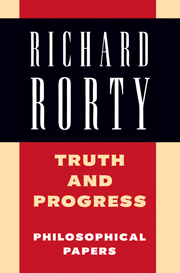Book contents
- Frontmatter
- Contents
- Introduction
- I Truth and Some Philosophers
- 1 Is Truth a Goal of Inquiry? Donald Davidson versus Crispin Wright
- 2 Hilary Putnam and the Relativist Menace
- 3 John Searle on Realism and Relativism
- 4 Charles Taylor on Truth
- 5 Daniel Dennett on Intrinsicality
- 6 Robert Brandom on Social Practices and Representations
- 7 The Very Idea of Human Answerability to the World: John McDowell's Version of Empiricism
- 8 Antiskeptical Weapons: Michael Williams versus Donald Davidson
- II Moral Progress: Toward More Inclusive Communities
- III The Role of Philosophy in Human Progress
- Index
6 - Robert Brandom on Social Practices and Representations
Published online by Cambridge University Press: 06 July 2010
- Frontmatter
- Contents
- Introduction
- I Truth and Some Philosophers
- 1 Is Truth a Goal of Inquiry? Donald Davidson versus Crispin Wright
- 2 Hilary Putnam and the Relativist Menace
- 3 John Searle on Realism and Relativism
- 4 Charles Taylor on Truth
- 5 Daniel Dennett on Intrinsicality
- 6 Robert Brandom on Social Practices and Representations
- 7 The Very Idea of Human Answerability to the World: John McDowell's Version of Empiricism
- 8 Antiskeptical Weapons: Michael Williams versus Donald Davidson
- II Moral Progress: Toward More Inclusive Communities
- III The Role of Philosophy in Human Progress
- Index
Summary
Robert Brandom's Making It Explicit and John McDowell's Mind and World were both published in 1994. Both books help us see the overlap between the views of two important recent critics of empiricism – Wilfrid Sellars and Donald Davidson. These two philosophers never discussed each other's work, but they complement one another beautifully.
Though they share indebtedness to Sellars and Davidson, the two books differ dramatically. Brandom helps us to tell a story about our knowledge of objects diat makes almost no reference to experience. He does not so much criticize empiricism as assume that Sellars has disposed of it. The term “experience” does not occur in the admirably complete index to Brandom's 700-page book; it is simply not one of his words.
By contrast, McDowell's book tries to defend empiricism against Sellars and Davidson – conceding most of their premises but dissenting from their conclusions. Brandom can be read as carrying through on “the linguistic turn” by restating pragmatism in a form that makes James's and Dewey's talk of experience entirely obsolete. McDowell can be read as arguing that pragmatists should not be allowed to banish the term “experience” from philosophy, because the price of such disappearance is much greater than Sellars, Davidson, or Brandom realizes.
The possibility of such disappearance raises the question of the place of British empiricism in the history of philosophy. The American pragmatists have usually been viewed as belonging to the same empiricist tradition to which the so-called logical empiricism of Russell, Carnap, and Ayer also belongs. The pragmatists’ version of empiricism has seemed, to many historians of philosophy, to differ from others simply by being less atomistic in its description of the perceptual given.
- Type
- Chapter
- Information
- Truth and ProgressPhilosophical Papers, pp. 122 - 137Publisher: Cambridge University PressPrint publication year: 1998
- 8
- Cited by



